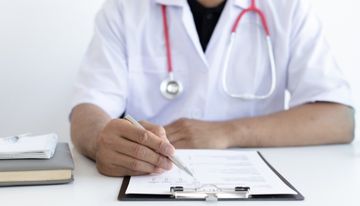Screening for STDs/STIs
In order to detect sexually transmitted diseases (STDs) or "sexually transmitted infections" (STIs), specific tests are required. Turó Park Clinics offers all the most common tests, including clinical examination of the genitals, local swabbing, urine analysis and blood sampling.
By choosing to book your STD testing with Turó Park Clinics, you can choose where to have it done: at the clinic, at a partner laboratory or at home. We offer several different packages from which you can choose the option that best suits your needs.
When should you get tested for STDs?
Specialists advise you to get tested after unprotected sex, even if you have no symptoms. Similarly, it is essential to get tested if you suffer from any of the following symptoms:
- Pain with urination
- Unusual vaginal discharge
- Irritation, burning or tingling in the genital area
- Pain during sex
- Pelvic pain
- Appearance of small pimples or warts on the genitals
- Severe fatigue or nausea
Make an appointment with one of our doctors if one of your sexual partners has been diagnosed with:
- Gonorrhoea
- Syphilis
- Chlamydia
- HIV
When to test for STIs?
It is important to take into account the incubation times of the different STIs in order to obtain reliable test results. These times vary between STIs.
However, if symptoms appear, it is recommended that you get tested without delay, even if it means getting tested again later if necessary.
GONORRHOEA: 2 WEEKS
CHLAMYDIA: 2 WEEKS
TRICHOMONIASIS: 2 WEEKS
MYCOPLASMA INFECTION: 2 WEEKS
SYPHILIS: 6 WEEKS
HIV: 6 WEEKS
HEPATITIS B AND C: 12 WEEKS
*Time to be tested following high-risk intercourse
Privacy
At turó park clinics we take confidentiality very seriously
Efficiency
We will send you your results digitally as soon as possible. You can make your appointment and pay online.
Multilingual medical assistance
Our medical advisors and doctors will guide you through the process in your own language.
Security
In clinics or laboratories, our centres are equipped and disinfected after each patient according to the measures recommended by the WHO.
What are the main sexually transmitted infections (STIs)?
There are a wide variety of STIs/STDs with different characteristics and symptomatology. Among the most common are
- HIV or AIDS virus
- Hepatitis B
- Syphilis
- Chlamydia
- Lymphogranulomatosis venereum (LGV)
- Genital herpes
- Human papillomavirus (HPV) infection
- Blennoragia (commonly known as "hot piss")
- Vaginitis/trichonomiasis
- Mycoplasma infections, caused by different bacteria
- Some vulvovaginal mycoses.
Among these diseases, some are relatively minor but can still lead to complications, including maternal-fetal transmission with damage to the newborn in the event of pregnancy, while others are more serious, as in the case of AIDS or hepatitis B. It is also important to note that all STIs weaken the mucous membranes and considerably increase the risk of contamination by the AIDS virus.
How do STI tests work?
Depending on the STI, different types of tests can be used for screening and diagnosis. Turó Park Clinics offers three types of tests:
Smears can detect sexually transmitted infections (STIs) such as gonorrhoea, genital mycoplasma, trichomoniasis and chlamydia.
Depending on patients' sexual practices, urethral/vaginal, anal or oral swabs should be taken.
Urine tests are used to screen for chlamydia, trichomoniasis, Mycoplasma infections and gonorrhoea in men only.
They are performed on the first stream of urine, i.e., the first morning urine or the first part of urination after at least 3 hours without going to the toilet.
→ Book the STD test best suited to your needs
We have different types of tests available depending on the analysis you want to perform. Choose the one that best suits your needs.
What type of STI test should I choose depending on the STI to be detected?
| STI | Type of sampling |
| Gonorrhea |
|
| Hepatitis B |
|
| Hepatitis C |
|
| Genital herpes |
|
| Chlamydia infection |
|
| Mycoplasma genitalium |
|
| Papillomavirus |
|
| Syphilis |
|
| Trichomoniasis |
|
| HIV (AIDS virus) |
|
What should I do if I test positive?
If your STD test is positive, you can consult one of our English-speaking doctors at Turó Park Clinics. He or she will explain the results and guide you through the various treatment options available to you.
If you are HIV-positive, a combination of lifelong treatments (triple therapy) can be considered to stop the progression of the disease. However, it is not yet possible to completely eliminate the virus.
To treat syphilis, antibiotics are usually prescribed and the prognosis for recovery is very good. The patient's sexual partners must also be treated.
Antibiotics are the most common treatment for trichomonas vaginitis, gonorrhoea, lymphogranulomatosis venereum and mycoplasma infections.
Genital herpes cannot be completely eliminated. However, treatment can relieve the pain and limit the duration and intensity of the herpes if it recurs.
Finally, in the majority of cases, hepatitis B heals spontaneously, but in some cases it can become chronic.

Quality care network
Our answers to the most frequently asked questions about STD testing
Do I have to go to the clinic for my test?
How do I prepare for an STD test?
Should I be tested if I have no symptoms?
Can I be tested for all STIs at the same time?
Is your result positive? Consult one of our doctors for medical care
Please contact us to book an appointment.



